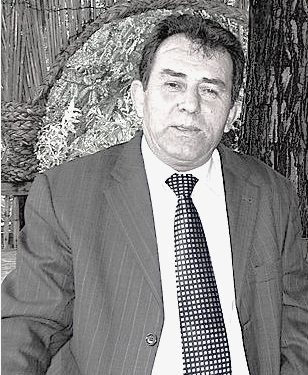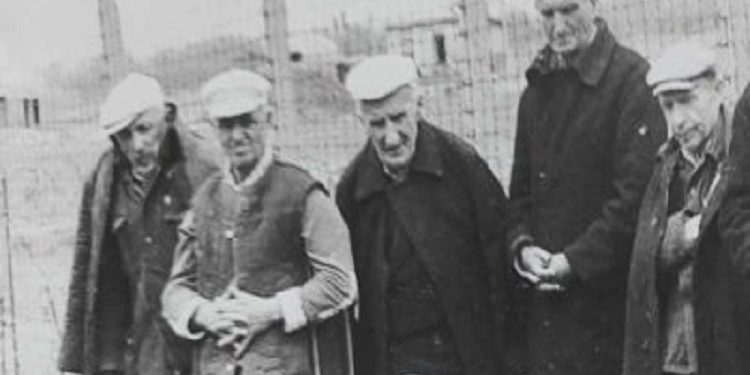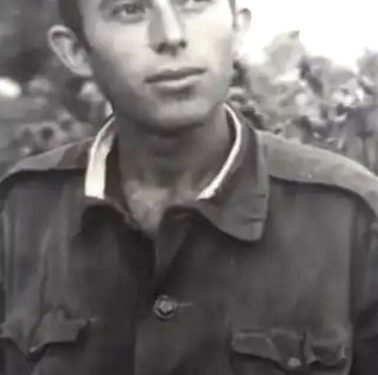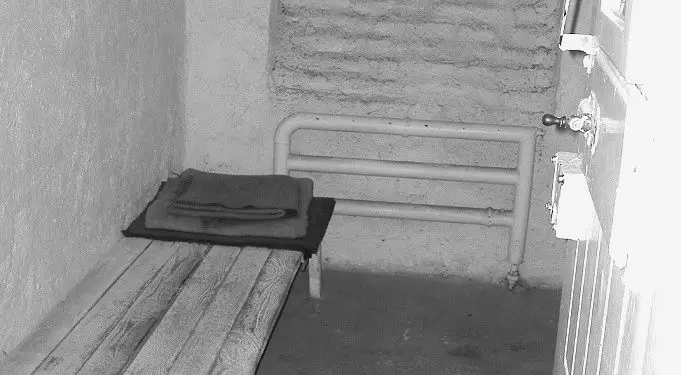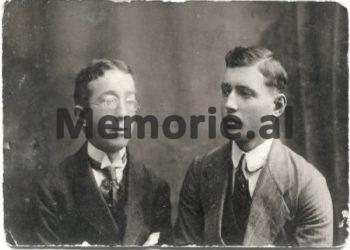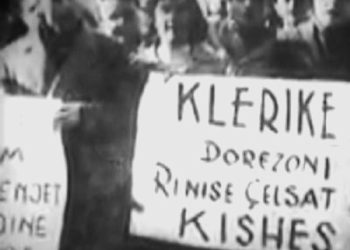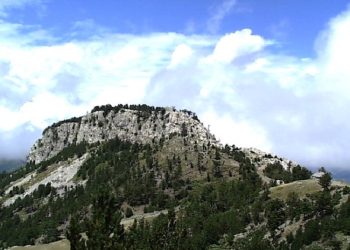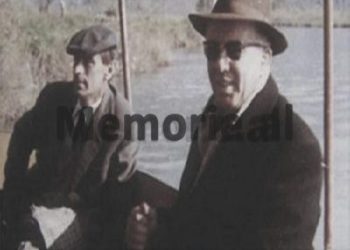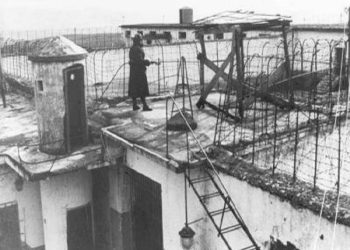By Shkëlqim Abazi
Part thirty-two
Memorie.al / I were born on December 23, 1951, in the black month of a black time, under the blackest communist regime. On September 23, 1968, the sadistic chief interrogator, Llambi Gegeni, the ignorant investigator Shyqyri Çoku, and the cruel prosecutor Thoma Tutulani, mutilated me at the Internal Affairs Branch in Shkodër. They split my head, blinded one eye, deafened one ear, and after breaking several of my ribs, half of my molars, and the thumb of my left hand, they sent me to court on October 23, 1968. There, the wretched Faik Minarolli gave me a ten-year political prison sentence. After they cut my sentence in half because I was still a minor, a sixteen-year-old, they sent me to the political camp of Reps on November 23, 1968. From there, on September 23, 1970, I was transferred to the Spaç camp, where on May 23, 1973, during the revolt of the political prisoners; four martyrs were sentenced to death and executed by firing squad: Pal Zefi, Skënder Daja, Hajri Pashaj, and Dervish Bejko.
On June 23, 2013, the Democratic Party lost the elections, a perfectly normal process in the democracy we aspire to have. But on October 23, 2013, the General Director of the “Renaissance” Government issued order No. 2203, dated 23.10.2013, for the “Dismissal from duty of a police employee.” So, Divine Providence intertwined with the neo-communist “Renaissance” Providence, and precisely on the 23rd, I was replaced, no more and no less, by a former State Security operative from Burrel Prison. What could be more telling than that?! The former political prisoner is replaced by his former persecutor!
The Author
SHKËLQIM ABAZI
R E P S I
(The Forced Labor Camp)
Memoir
The doctor’s advice didn’t work, so he remained where he was. “The Scorpion” had sentenced him to a month in the cell. As he was leaving, Dilo filled a flask with water and left it behind the door, but the policeman saw him and rushed at the assistant doctor. “What are you doing, man, do you want to spend the night with him too?!” “It’s water!” Dilo defended himself. “I brought it for him because he’ll need it to take his medicine!” “Ah, he needs to be given medicine, this bum!” the policeman burst out. “Yes!” the doctor intervened. “If he doesn’t take this medicine, he’s at great risk.” The doctor’s intervention seemed to convince the scorpion, who pulled the door shut, locked it, and left. They left Kosta helpless in the cell.
There is no act more criminal than to kill an artist’s soul! The bird confined in a cage is not at all tempted by the beauty of the aviary; with hope, it casts its gaze upon the thorny bushes, where it may even bleed its wings, but it tastes freedom! Kosta was groaning from intestinal cramps, but his heart was tormented even more. He was born to be free; slavery was not a costume for his size. In the days that followed, his torments increased even more; he was now suffering from the heat for water, his stomach was gnawing for bread, and his mind was craving for freedom! He waited impatiently for the hour when they brought food, took what they gave him, gobbled it up on the spot without looking at it, and still did not feel full. Hunger had turned his stomach into an insatiable pit.
Then began the torture of thirst. Although he quenched it twice a day, the heat and the floor did their thing. When we took him to the toilet, he would go to the faucet, put the bowl to his mouth and suck and suck, until he was in a daze. When he felt suffocated and his belly was excessively swollen, he would let go of the bowl, but the sweat was pouring off him, and he felt thirsty again. He repeated this action two or three times, and when he remembered to fill the flask, they would push him into the cell, close the door, and leave him behind it, waiting for the next twelve hours. He would start screaming as loud as he could; if a kind-hearted policeman happened to be there, he would return, open it for him, and allow him to fill up with water. When the strict ones happened to be there, the flask would remain dry until evening or morning, depending on the mealtime.
Kosta, annoyed that he was left without a drop of water, would slam the flask against the wall, as if it were its fault. Thus, the flask, thrown in a fit of nerves, would roll into a dark corner of the cell, and it would remain uncapped all day. His madness was getting worse and worse; although he was harmless to others, he caused irreversible damage to himself. The idea was ingrained in him that he was destined to be sacrificed as a messiah of science. Meanwhile, his study on larvae and tailed worms was taking shape, and Kosta himself hoped that one day he would be given the chance to present his scientific paper at important international symposia.
However, to complete his study, he would need several years, but the sentence was ending before the deadline he had foreseen to finish the experiment. So one beautiful day, he addressed a request to the Presidency of the People’s Assembly to extend his release date for a few more years, citing as a fundamental reason the unsuitable conditions in another environment.
“If you have the kindness to consider the request with goodwill, you will receive my thanks, but also those of the entire academic world, and even of the most prestigious organizations of world science,” he concluded his plea. This information was given to me by Apostol Thana, a minority from the villages of Lower Dropull, a friend of mine and Kosta’s, who had read the request memorandum himself. The poor Kosta was so deeply immersed in the labyrinths of his own madness that he failed to understand that most people were making fun of him, while those who truly felt sorry for him tried in a gentle way, without causing him spiritual dramas, to restore his clarity of reason.
Over time, the police also joined in the game. Every time they took him for treatment to pavilion seventeen, they improvised ridiculous scenes, as if a foreign scientific institution was interested in his study and had supposedly sent a special team to meet with him. In these cases, Kosta flew to the seventh heaven, but at the same time, he was totally committed to “coming out clean” in front of the foreigners.
In one such case, according to what my friend Apostol told me twenty years later, they wanted to send him to the hospital, but he, as always, objected, arguing that he was not sick. The police could have put him in handcuffs by force and that would have been the end of it, but since Kosta did not show any signs of aggression and it was very easy to convince him to attend scientific meetings, they set up the prank. He filled his bags with the prepared materials and gladly got into the prison van and headed towards Tirana.
When he arrived at the prison hospital, a professor of psychiatry, who had the type of disease from which Kosta suffered as his topic of study, organized a group of medical students, and the next day, they improvised the famous meeting of the scientist Kosta with foreign specialists, who were supposedly “amazed” by his discoveries and had supposedly taken the long road to Albania from several foreign countries. Kosta, who took everything as real, under a hail of applause, delivered the most passionate paper that any Nobel laureate could have ever referred to, while the professor also had the most exemplary opportunity to demonstrate delusional fixations to his students in practice.
In 1991, I was an economic refugee in Greece. As an illegal, I was hiding from the police in the forests and reeds. One day in the bushes where I had my residence, I met a man with a pickax and a sack on his shoulders, who, according to his story, roamed the streams to collect medicinal plants. He mistook me for a vandal and in clean Greek, he asked me to show him where there was a water source to drink. With my broken Greek, I told him about the stream. When he replied in Albanian, it turned out that we were both compatriots.
We sat down, he drank water, and we started talking. I found out he was a doctor, but his miserable appearance did not reveal it. Big-headed, with uncombed and unkempt hair, maybe since he had left his hometown, an unshaven beard, and very dirty, a perfect goblin. In appearance, he did not give the impression of a normal person, and even more so, a doctor. When I asked him his name and where he was from, he replied:
“I’m from the south, but I live in Tirana. My name is Arqile Boti…, I used to be married and I have a daughter.” This name reminded me of a famous doctor who was said to be a good professional, but a bit mentally ill. At least his appearance reinforced this belief. At the moment I was carefully looking at this disoriented man, I don’t know why Kosta R…! Came to mind. The resemblance between them was like an identikit. We talked and talked, and the conversation came to the clashes on the unknown shores of life and the wandering in the waves of time. Then, we talked about the ways in which the same problems are experienced by different individuals.
Surprisingly, he was clear in his thoughts, with excellent eloquence and sound reason. He made it clear to me from the beginning that life is a personal gift, and as such, no one has the right to interfere in another person’s part. I took this as a way of self-defense he was making for his messy appearance and as a kind of armor for the widespread gossip about his mental health. But no, I was wrong. He was knowledgeable, very intelligent, a little more talkative than he should be, but not at all selfish.
“In this life there is never certainty, you never know what tomorrow will bring!” he began to speak. “After my studies, my dreams were killed; I have lived a closed life. I don’t say imprisoned. No, oh no, I haven’t been in prison! But worse than in prison! I wasn’t even interned, no, but worse than in internment! Persecuted in the forests of Biza. And what do you expect from a being when you deprive it of freedom?! Don’t hope to see a person in a suit and tie in a sheepfold, my friend! Who would the shepherd wear a tie for? The sheep or the dogs? So, I threw away the suits and ties and wore moccasins and shalwar pants! I found solace for the great loss in the service I offered to my patients and in books.
I roamed from forest to forest and from slope to slope like a hermit; I looked for medicinal plants, I studied their rare healing properties. I believe you understand how much we suffered for medicine back then. Self-reliance also conquered medicine; the paranoia of xenophobia left no open path! So I too found shelter in the forests, among these plants. To be realistic, where they banished me, there were plenty of plants and I had plenty of time. Because where would you go, brother? There were only mountains and forests! And I decided, since I’m here, I’ll make an amulet; I found it as a way to pass the time! I also learned myself, and I also helped people!
I rarely came to the city, because even if I wanted to, how would I travel? Then I liked the environment there; the residents of that area were upright and honest, and what’s more, they held me in high regard. When I went down to the city, I stocked up on what I considered most necessary, especially books and, in particular, scientific and professional literature. At that time, I happened to get to know a former political prisoner who suffered from mental disorders. During his time in prison, he had been involved in scientific studies; at least that’s what he claimed. At first glance, he did not give the impression of a mentally ill person. He was very polite, educated, and cultured. When you talked to him, you felt as if you had discovered a treasure in the inexhaustible chest of ideas.
He was very knowledgeable. Of course, not all of his thoughts were important; there were also foolish things by the ton that no scale could lift, but his studies on plants and their unknown medicinal properties were very useful to me in my craft. He wrote about the world from its beginning, starting with amoebas, fish, birds, plants, and up to man. He talked about the benefits of natural life, how to eat healthily, how to get as much as possible from the gifts of nature, etc. I did not agree with many of his didactic conclusions, because, for example, how can a person eat toilet worms and with…?” “Kosta R…?” I jumped, suddenly cutting him off. “Wow…?” his tongue was cut off.
He remained speechless, with his chin jutting out like the moss of a hatchet, and fell silent. For a few moments, he stared at me, as if weighing me with his expressive eyes, and then he said: “You knew him too?” “Yes, we were together! But I’m surprised how you knew him!” “Through a doctor friend of mine, from his village. Kosta brought me a sack of his writings with his studies, translated into several languages. He wasn’t as crazy as you thought; that man was really with fixations, but intelligent. In other circumstances, he could have become someone. His studies have been useful to me even though he never finished them…!”
Of course, this study was never finished, because it couldn’t be, since its origin was madness. But the storyteller also seemed to me to be of the same mold. “What a resemblance between these two fates!” I thought then, as I still do. They found poor Kosta one morning drowned in his beloved Bistrica, where he had bathed for the first time… and also for the last time in his life. No chronicle or obituary was written for him. Even today in those parts, he is mentioned as a positive, harmless madman who destroyed himself to serve the whole world. This is how the life of an artist ended, with many dreams, shattered in the cells of Reps.
It was normal for me to feel bad when I learned of his end from a friend of mine from Aliko. But it made me feel even worse when he threatened me: “But who will answer for Kosta’s dreams? Or were his aspirations, like all the others, locked up in the cells of Reps, blaming Enver…?” That whole night I slept a heavy, solid sleep, as they say. Not counting the moments when Dom Mark had to turn to the other side because his bones were hurting from rheumatism, or when he got up to pour his thin urine into the flask near the door—he suffered from prostate problems, and I would wake up, whether I wanted to or not—the rest I didn’t understand how it flew by so fast.
When the locks clanged, Dom nudged me by the feet so as not to hurt my shoulder. “Get up, the… dawn has come!” maybe he wanted to say “the policeman,” but he held back. “It’s very nice to wait for it, in this place!” He folded the upper blankets and waited for me to get up to fold the one we had used as a mattress. “Is he still not up?! Man, do you want a bucket of water on top to wake up?” The policeman’s threat made me sober up. I jumped up quickly. I needed water now!
I suddenly remembered the previous day, with the soaked clothes, and my hair stood on end. Dom Mark handed over the last blanket. (I want to emphasize that he was distinguished for fast and concise actions, which saved you from punishment within punishment, a thing that, thanks to his experience and my time with him, I would soon acquire myself). After we finished our personal services in the toilet and at the faucet, the policeman closed the door again and left. Now the marathon began.
A prolonged twelve-hour torture, incomprehensible to any human imagination. On foot, you had to measure the cell back and forth and all around, in the daily kilometer-long walk; which, according to Ismet Boletini’s eccentric theory, which he would explain to me later, when I had already covered over 1000-2000 linear kilometers of walking in the cell; he called this: “a virtual walk on the meridians and parallels of the globe, surrounded by barbed wire.”
The morning was frosty. Now, without a blanket, the wind that entered would dry out everything; it rushed in from the torn sides of the sheet metal and the cold would get into your marrow. I hurried my steps to warm up; jets of steam clouds came out of my mouth, a sign that an icy day was waiting for us. In the dim morning light, I tried several times to decipher the letter I had in my pocket, but the day had not yet broken. The endless winter nights, which in that frosty valley of Mirdita did not end before seven o’clock, did not allow this. So, I had to wait.
When it dawned, I took it out again. In the light, I could now make out the microscopic writing, but I couldn’t make out the letters, not because of my failing eyesight, but because it was written with a faint pencil and very tiny. Nevertheless, I understood the meaning of what they wrote to me. The content was more or less this: “Dear boy, we feel proud of you! With your gesture, you brought us back to our youth once again! When we learned how the event had unfolded and your reaction, we were amazed! Well done, you defended your honor and our dignity too!
Son, the cell is indescribable; we have experienced its difficulties ourselves, and its bitter fruits have caused us endless trauma! That’s why we didn’t prepare you in advance, because our hearts didn’t tell us to bring that upon you! Naturally, we should have told you about the evil scab that destroys human bodies. We feel guilty, but the desire for you not to end up there made us keep silent. Forgive us!
Nevertheless, we blindly believe in your adaptive abilities, we hope that with the strength of your character, you will pass this test with dignity. Men are not defeated by pain, and you are a man, now! As a mutual friend of ours advises: “to become a professor, you have to try everything,” now the day has come for you to show it with actions. And we know, you can do it!”
Below was a Post-scriptum: “Through N.K., we are sending you something to wear and some tobacco. If we can, we will send more. You will find others there, even though the best men end up in the cell, there are also exceptions. Keep your eyes open! Learn from them, if you think they are worth it; otherwise, continue on your own path. You have Dom Mark there, give him our best regards! If you happen to be together, all the better! With faith in your strength and honesty, we wish you an early release, but are careful to pass the test successfully!” Waiting for you: YOUR PARENTS.
I was very emotional! It was more than normal for me to sob. Tearfully, I went back to the beginning several times to decipher those few words that I couldn’t make out well. But instead of letters, the faces of those dear prisoners appeared to me, and the echo of their voices buzzed in my ears. I got the message of the letter. As always, they flattered me with the finest rhetoric, encouraged me to face the repression. By referring to their trust in my abilities, they touched my ego, etc.
This way of acting was the most valuable support I needed at that moment. Many hypotheses arose in my scattered brain, but the most emphasized one was: “What kind of people are these?! Even here in the wolf’s mouth, under the claws of death, they find the strength to sacrifice?” I was not able to find a correct answer, nor did I rack my brain because my young mind could not fit into those limits.
So I left the rhetoric I had started in my notebook unfinished and read the letter to Dom Mark. He listened carefully, but did not speak. In the end, a deep sigh escaped his lips, which he followed with the sign of the cross, which he made quickly, as he also recited an Ave Maria, and then turned to me: “Who are they?”
I answered with assumptions. In fact, I didn’t know the handwriting and I wasn’t able to determine the exact author of the letter. But what did the hand that had put these words on paper matter, I knew the hearts! I told him about my first day in the camp, (or rather, night), that my saga began one evening.
I told him about old Esheref, the ironic and mocking man from Dibra, who urged me to learn to declare myself a prison professor; about Vaska, the Orthodox priest, who with Olympian calm, urged me towards knowledge and education; about Sulo, my dear Berat friend, who supported me even when I was wrong; about old Daut, the strict man from Labëria, who equated his faith in my grandfather, who had died thirty-something years ago, with the respect he had for me.
I told him about the brothers Riza and Muharrem Dyli and the protection they guaranteed me, as if I were a statesman; about Hafëz Sabri Koçi and Father Zef, the religious men who nourished my soul; about Meleq Hasa and Qazim Vula; about doctor Çitozi and Dilo, the omnipresent and cunning nurse and his positive tricks; about crippled Emin and about all those who were close to me during those two months.
And I would have continued, but the priest intervened: “You have fallen into good company, my boy, you are lucky! Not everyone has this luck! All of them are the most respected men, so you should honor them like your father! They are very old, and at this moment they feel worse than you and I! You must save them from this trouble that has taken hold of them!” “The trouble has taken hold of us, dear Dom, me, you, and these two on the other side!” I interrupted him, pointing with my finger across the dividing wall.
“We are suffering hell here in this freezing place, priest! They are indeed in trouble because they have been in prison for a long time, separated from their families and children, but we are worse here because we are also in prison, and in the prison of the prison. Well, then, tell me now, who is in more trouble?!”
“Yes, maybe you’re right! But neither you nor I are parents, to feel the pain of a parent! Do you understand, my boy! But you are too young to really understand! I am a priest myself and I know very well what a wounded parent means! It’s not easy to see your child in distress and not be able to be close to him! Well, they are parents, and a parent does everything! They are ready to give of themselves to save their child!
Have you seen that little sparrow, how it puffs up at the owl and the hawk, to save its little ones in the nest? Well, it’s just a sparrow, as tiny as a speck, but the parental feeling to protect its child makes it a David! And those old men, they feel the same way. So we must save them! And their salvation is your good! So, you must take care, not only for yourself, but especially for them!” the priest concluded./Memorie.al




